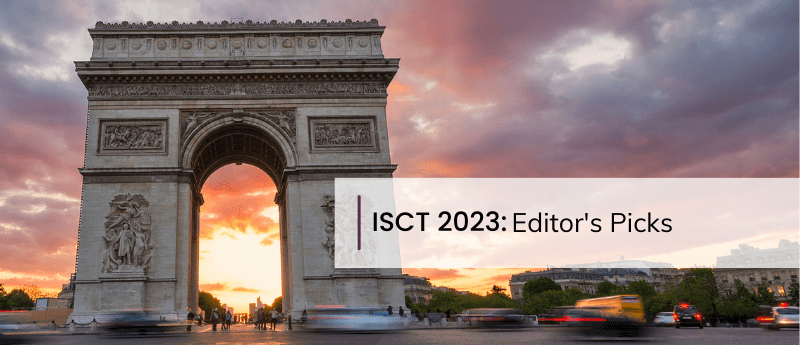ISCT 2023: Editor’s picks

The International Society for Cell and Gene Therapy (ISCT) returns for its 29th annual meeting (31 May-3 June, Paris, France) with the theme, ‘celebrating the progress of advanced therapies and building the future through translation.’
The 2022 program saw the addition of roundtable sessions and following their fantastic success ISCT has expanded and extended the roundtable program for 2023, now hosting over 50 sessions to provide a greater space for critical conversations to take place.
Read on to discover my highlights from the agenda of ISCT 2023!
Regulation: addressing global issues to improve patient access
- Roundtable: Lack of Harmonization in CGT: Can We Achieve Global Convergence? (31 May, 10:45): As the field of cell and gene therapy continues to evolve, the question of whether convergence should be an objective arises. In this round table, chaired by Ilona Reischl (EMA Committee for Advanced Therapies; Austria) and Massimo Dominici (University of Modena and Reggio Emilia; Modena, Italy), panelists will discuss the harmonization of cell and gene therapy, focusing on aspects such as nomenclature, regulation and GMP manufacturing.
- Roundtable: How will the EU SoHO Regulation Impact Your Cell Collection? (31 May, 13:00): Explore how the European Commission’s proposal for a regulation on the safety and quality of substances of human origin (SoHO) will impact the collection of blood, tissue and cells in Europe and the resulting implications for advanced therapy medicinal products.
Manufacturing: overcoming bottlenecks to meet increasing demands
- Roundtable: Point-of-Care Manufacturing: Disrupting & Decentralizing Autologous Delivery (31 May, 14:15): Is point-of-care manufacturing the best near-term solution to overcome the challenge of commercial patient access? Patrick Rivers (Aquilo Capital; CA, USA) will lead discussions on the regulatory considerations, barriers to broad adoption and the feasibility of establishing point-of-care manufacturing.
- Concurrent Session: Required infrastructure for manufacturing advanced therapy products at mass scale (June 2, 15:45): How can product and process developers, and manufacturing and commercialization specialists prepare for the ever-increasing demand for cell and gene therapies?
Clinical Translation: navigating the path from bench to bedside
- Concurrent Session: Allogeneic vs Autologous Debate – Developing Cell Therapies with an Eye to Patient Access (2 June, 08:00): Julie Allickson (Mayo Clinic; MN, USA) and Bruce Levine (University of Pennsylvania; PA, USA) will be joined by experts from across the industry to share their perspectives on whether the success of allogeneic CAR-T cell therapies reflects the potential of the field.
- Concurrent Session: Challenges in Cell Therapy for Solid Tumors (2 June, 9:15): Is a breakthrough for cancer treatment on the horizon? Although cell therapies have had some success in the treatment of hematological malignancies, solid tumors remain a challenge. This session will discuss the various possible approaches to address this issue.
Workforce development: closing the talent gap
- Roundtable: Elevating the CGT Workforce in Europe – Challenges, Opportunities, and Educational Approaches (3 June, 10:15)
- Roundtable: Retaining the CGT Workforce: How NOT to Lose a Technician in 10 Days (June 3, 11.45)
Asia Pacific Sessions: navigating the market
- Roundtable: Maximizing CGT product value – Why you shouldn’t overlook APAC (3 June, 9:00)
- Roundtable: Market Access and Reimbursement: Same Problem, Different Region (3 June, 10:15)
Let us know what you are looking forward to by tweeting us @RegMedNet, or leave a comment on Facebook or LinkedIn! 